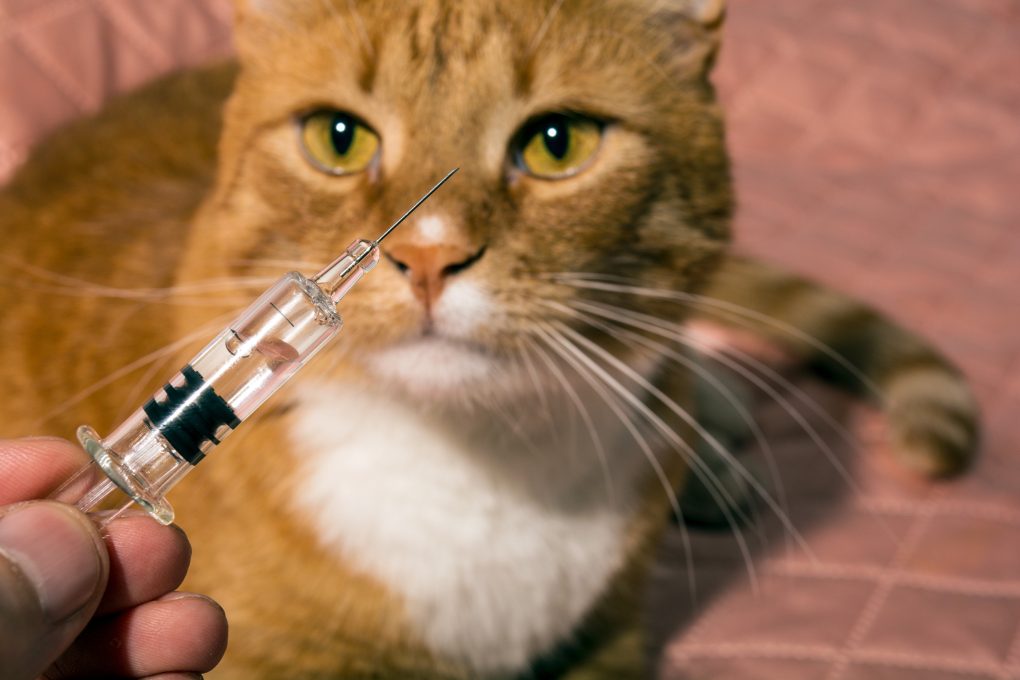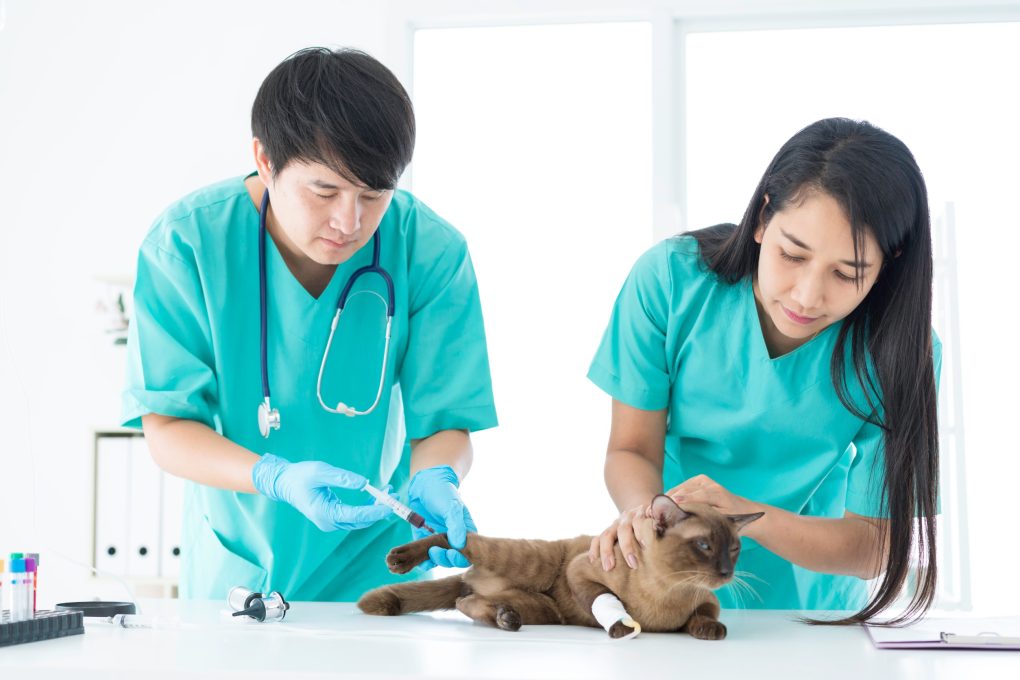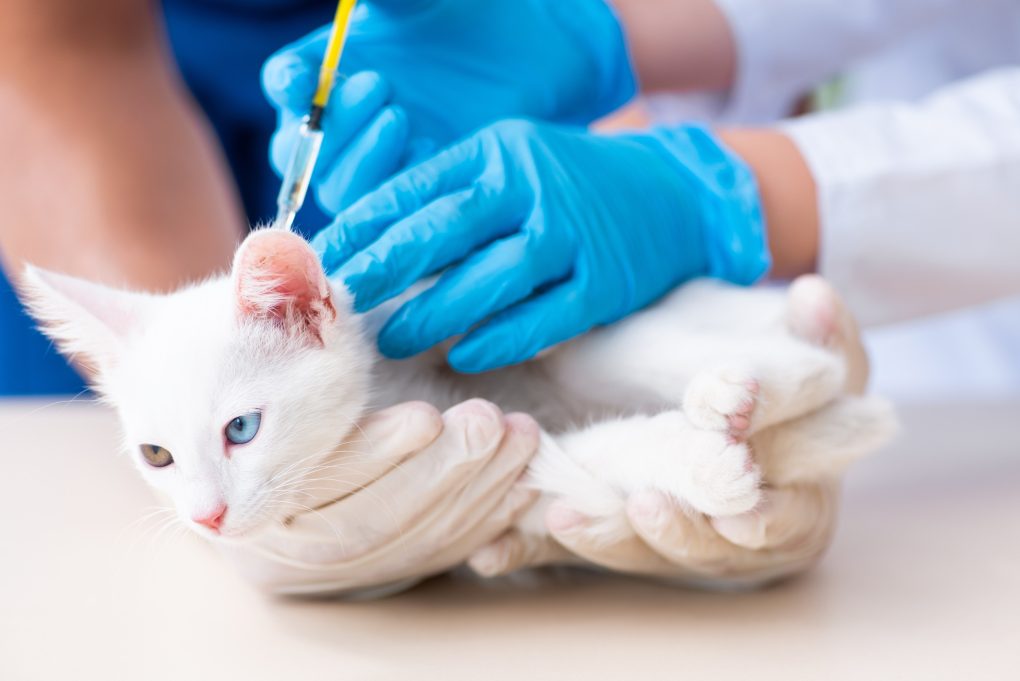Do Cat Need Shots: What Vaccinations Do Your Cat Need, and Its Benefits and Risks
Yes, cats do need shots to protect them from various diseases. Vaccinations are an important part of your cat’s preventive health care and are necessary to keep them healthy and protect them from potentially life-threatening illnesses. Vaccines work by activating the immune system to produce antibodies against specific infectious agents, protecting the cat from getting sick if exposed to those agents in the future.
Table of Contents
List of Vaccines Cats Need


FVRCP
FVRCP stands for Feline Viral Rhinotracheitis, Calicivirus, and Panleukopenia. It is a combination vaccine that protects cats against three common respiratory viruses: rhinotracheitis (feline herpes), calicivirus, and feline panleukopenia (feline distemper), according to Poly Springs Veterinary Hospital.
Feline viral rhinotracheitis and calicivirus are highly contagious and can cause upper respiratory infections in cats, with symptoms such as sneezing, coughing, and runny nose. Panleukopenia, or feline distemper, is a highly contagious and potentially deadly viral disease that attacks the immune system and can cause symptoms such as fever, vomiting, diarrhea, and dehydration.
The FVRCP vaccine is typically given as a series of injections starting when a kitten is around 6-8 weeks old, with boosters given every 3-4 weeks until the kitten is around 16 weeks old. Adult cats should receive a booster shot every 1-3 years, depending on their risk factors and lifestyle.
Rabies
Rabies is a viral disease that impacts the central nervous system of mammals, including cats and humans. It is a serious disease that can be deadly if left untreated.
All cats should receive the rabies vaccine to protect them against this deadly disease. The rabies vaccine is usually given as a single injection when a kitten is around 12 weeks old. Depending on their risk factors and local laws, adult cats should receive a booster shot every 1-3 years.
In many parts of the world, including the United States, the rabies vaccine is required by law for all cats because cats are at risk of coming into contact with wild animals, such as bats or raccoons, which can carry the rabies virus. Vaccinating cats against rabies protects them and helps prevent the spread of this disease to humans and other animals.
Feline Leukemia Virus (FeLV)
Feline leukemia virus (FeLV) is a viral disease that affects cats. It is a serious and often fatal disease that can lead to cancer, anemia, and other health problems.
The FeLV vaccine is recommended for all cats, especially those who go outdoors, come into contact with other cats, or live in multi-cat households. The vaccine is usually given as a series of injections when a kitten is around 8-12 weeks old, followed by booster shots every 1-2 years.
FeLV is highly contagious and can spread through infected saliva, urine, or feces. Cats infected with FeLV may not show symptoms initially, but the virus can weaken their immune system over time and lead to serious health problems. Vaccination is an important step in preventing the spread of FeLV and protecting the health of cats.
Feline Immunodeficiency Virus (FIV)
Feline Immunodeficiency Virus (FIV) is a viral disease that affects cats. It is similar to the human immunodeficiency virus (HIV) and can weaken a cat’s immune system, making them more susceptible to other infections and diseases.


The FIV vaccine is not routine and is only recommended for cats at high risk of infection, such as outdoors, who come into contact with other cats. The vaccine is usually given as a series of injections when a kitten is around 8-12 weeks old, followed by booster shots every 1-2 years.
FIV is transmitted through contact with infected saliva, usually through bites from infected cats. Cats infected with FIV may not show symptoms initially, but the virus can weaken their immune system over time and lead to serious health problems. While the FIV vaccine is not 100% effective in preventing infection, it can help reduce the severity of the disease and prolong a cat’s life.
Chlamydia
Chlamydia is a bacterial infection that can impact cats. However, it is not a routine vaccine typically given to cats. It is generally treated with antibiotics if a cat becomes infected. If you think your cat has been exposed to chlamydia, it is best to take them to a veterinarian for proper diagnosis and treatment.
Benefits of Vaccinating Cats
Prevention of Serious and Sometimes Fatal Diseases
Vaccines help prevent serious and sometimes fatal diseases that can affect cats. By vaccinating your cat, you can help protect them from illnesses that can cause pain and discomfort and potentially lead to long-term health problems.
For example, the FVRCP vaccine protects against feline viral rhinotracheitis (FVR), calicivirus, and panleukopenia, all serious and potentially life-threatening illnesses. The rabies vaccine is also important because rabies is a fatal disease that can be transmitted to humans.
In addition to protecting your cat, vaccination helps prevent the spread of these diseases to other cats in the community. This is especially important for outdoor cats or those that may come into contact with other cats through boarding or grooming facilities.
Protection of Public Health
Vaccinating cats can also protect public health. For example, the rabies vaccine protects cats from the disease and prevents them from spreading it to humans or other animals. Additionally, certain diseases transmitted from cats to humans, such as cat scratch fever, can be prevented with the proper vaccination of cats. In addition, vaccinating cats can prevent the spread of disease to humans and other animals, which is an important public health benefit.
Cost-Effective
Vaccinating cats is generally cost-effective because the cost of vaccines is much cheaper than the cost of treatment for serious or fatal illnesses that the vaccines can prevent. Vaccines can also help avoid expensive medical bills and the costs associated with caring for a sick cat by preventing illnesses. Additionally, some vaccines, such as the rabies vaccine, are required by law in many areas, and failure to comply can result in fines or other legal consequences.
Reducing the Spread of Disease
Vaccinating cats can help reduce the spread of diseases between cats, which is especially important in multi-cat households or environments like shelters. Reducing the spread of disease can also reduce the cost and time required for treatment, quarantine, and disinfection.
Reducing the spread of disease can also help protect cats that cannot be vaccinated for health reasons or age. In addition, vaccinating cats is important in promoting the health and well-being of individual cats and the feline population.
Risks of Cat Vaccines
Allergic Reactions
Like any medical intervention, there is a risk of allergic reactions when cats are vaccinated. Signs and symptoms of an allergic reaction may include swelling at the injection site, difficulty breathing, vomiting, diarrhea, or collapse. These reactions are usually rare, but if you notice these symptoms after your cat is vaccinated, you should contact your veterinarian immediately.
Injection Site Reactions


Injection site reactions are common and can occur after vaccination. These reactions may include pain, swelling, and redness at the injection site. In rare cases, a small, firm lump may also form at the injection site. These reactions are typically mild and resolve independently within a few days.
Fever
Fever is a potential side effect of cat vaccines. Although it is usually a mild and temporary reaction, it can cause concern if it persists or is accompanied by other symptoms. For example, suppose your cat develops a fever after being vaccinated. In that case, it is important to monitor their temperature and contact your veterinarian if it persists or if your cat exhibits other concerning symptoms.
Over Vaccination
Over-vaccination is a potential risk associated with cat vaccines. Overvaccination refers to administering vaccines more frequently than necessary or without proper consideration of the cat’s individual needs. Repeated vaccinations can lead to adverse reactions, such as inflammation and autoimmune diseases.
It is important to follow the vaccination schedule recommended by your veterinarian and to discuss any concerns about over-vaccination with them. For example, some cats may have a higher risk of adverse reactions to vaccines, and your veterinarian may recommend alternative vaccination protocols for these cats.
